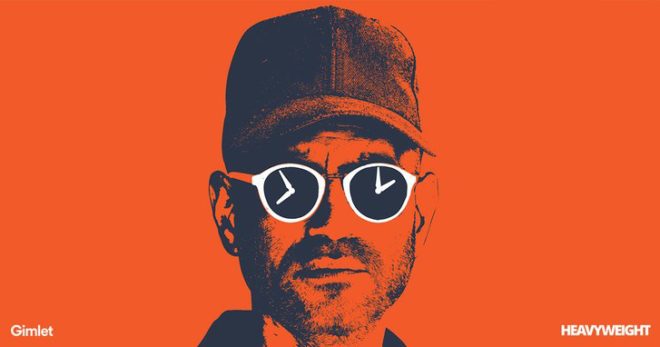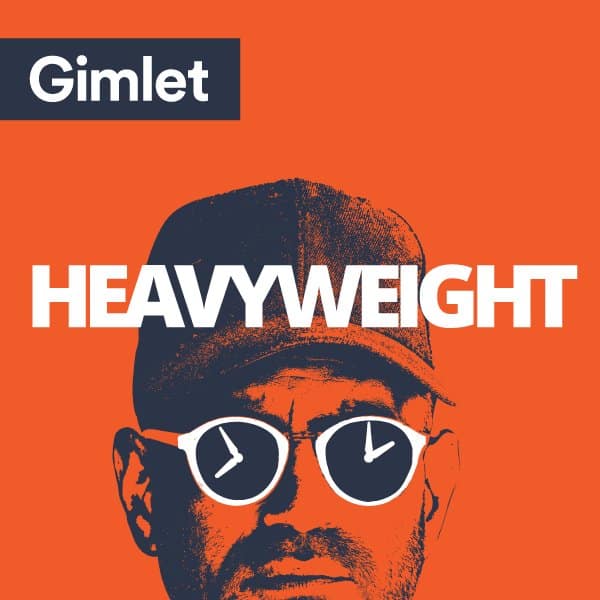Jonathan Goldstein perfectly blends humor and personal stories in Heavyweight


Here, it might actually be better if I quote Reply All podcast host, PJ Vogt’s description of Heavyweight:
It’s hard to capture all of what’s great about it. It’s very very funny, and very very heartfelt. And like tender, which is an embarrassing word to say on the radio. But you listen to it and you feel like a person who loves other people which is a pretty nice feeling to be connected to.
In case you’re unfamiliar, Heavyweight is hosted by CBC and This American Life alum, Jonathan Goldstein. Each episode follows Goldstein as he helps another person reexamine something, or more usually someone, who impacted their past. A lot of times, these events are full of regret and re-opening the door and having an honest discussion becomes almost therapeutic for all the parties involved.
Heavyweight remains on my must-listen list and constantly tells stories that stoke all your emotions.
I was fortunate enough to get the chance to speak with Jonathan about Heavyweight. Our conversation spanned several topics including his origin story, his thoughts on speed listening, his unique relationship with This American Life, and how he balances the comedy and serious manners of his podcast.
*in light of recent — and not so recent — events, we really need to find another example. Larry David maybe?
Listen: iTunes
***
Kevin: To start things off, can you give us a little bit of background on who you are, how you came from the CBC, to This American Life, and now Gimlet with Heavyweight?
Jonathan: I was doing some freelance radio essay type stuff for the CBC, and I was given a summer radio show on the CBC in the late 90s. The idea was I was going to travel to each of the Canadian provinces and do an episode on each. I was sent with this very large digital camera, that was the size of a stereo box that took floppy discs. At the time, it all felt very new. I got into radio at that point just sideways as a writer, as a venue to read my work, not thinking about radio per se.
I had a friend at the time who was involved in This American Life, Paul Tough. He knew they were looking for a producer and he encouraged me to apply. This was before podcasting, so people didn’t know about This American Life in Canada, but he introduced me to the show and I listened to it online.
I fell in love with This American Life. The idea of working at the show became very exciting. I sent off some of my radio work, which at that point was only a couple episodes of the summer radio series, and some of the radio essays. It had similar sensibility to what This American Life was doing, even though I didn’t know anything about radio. I didn’t know how to use software, how to cut tape or anything. I was hired and learned everything on the go. It was like a master class in radio. Worked there for a couple years, got some of my own stories on. Came back to Canada and did WireTap for 11 years and now I’m doing Heavyweight.
Kevin: It seems like the podcasters I’ve talked to seem to have non-traditional routes into podcasting, mostly because podcasts kind of sprung up out of the blue. It seems like your route fits that track as well. Talking specifically about Heavyweight, can you describe how you source a story and then go through producing the podcast? Obviously, some of the stories are from family members but some are from relatively unknown people.
Jonathan: Yeah. The second season was open to everybody. Heavyweight went through a big change from season one to season two because season one was mainly family and friends. People I’ve known my whole life and, in a sense, stories that have been incubating for decades. Then in season two, with that exhausted, the challenge was how do we take the literal premise of the show and apply it to people I don’t know? I didn’t know how that dynamic was going to work or whether it was going to work at all. That was scary, but it went okay and that’s heartening because it makes you feel the whole enterprise has legs and can keep going.
Kevin: Yeah, definitely. That was telling with season two. As you source the story you’re undoubtedly going to hit some walls. What percent would you estimate of your time spent ends up on the proverbial cutting room floor?
Jonathan: Not as high of a percent as a place like This American Life that has greater resources and staff. I don’t know if this is still the case, but half their stories — even ones that go into full production– end up getting killed. It’s how they maintain the level of excellence they achieve. In the case of Heavyweight, it became a different kind of challenge because there was more pressure to make things work. Really, the batting average was pretty good. There were a couple of stories that ended up on the cutting room floor and one that’s still undetermined. Another one kind of fell apart for a whole bunch of different reasons.
The challenge was taking things that were flimsy, made up of all kinds of disparate parts, and working it through doing rewrites and having very smart people bring their minds to bear on the materials. Sometimes, I believe simple stories became richer through this process. We try to give a sense of time passing in some of these episodes. It was a wonderful thing to be allowed to have the time to work on things in this way.
Sometimes the difference between a story that turns out really well and a story that dies walks along the razor’s edge for a while. Sometimes the stories that turn out to be great, are great because they almost tip into not existing.
Kevin: On that note, Heavyweight obviously deals with a lot of very personal, serious matters and some dark areas in people’s past lives. Throughout, however, you’ve maintained your comedic presence that’s interwoven within the stories. Was this a conscious decision going into the podcast, or something you knew was inevitable with your personality?
Jonathan: Yeah, my personality is kind of what it is at this point. I didn’t consciously decide it’s going to have such and such percentage of comedy versus this percent of seriousness. I figured it would be an offshoot of the way I write, and talk about things, and see the world. It wasn’t conscious but it still is something my editors, producers, and I wrestle with. Sometimes you don’t want to overwhelm the story with too much jokes.
To me, the best stories are the ones that have their funny moments and their dark moments. I’m probably totally mispronouncing this word, but “chiaroscuro”, a painting where the light is so beautiful because of the darkness. In this case it makes the funny parts funnier and the sadder parts even sadder, because you’re toggling between these two extremes. If you get that balance right, it’s a beautiful thing. It’s easy to get wrong and sometimes I do get it wrong, but that’s the challenge of doing this kind of thing.
Kevin: Yeah, that’s actually a great way to put it. I’m sure there’s another kind of delicate line you have to balance to add some levity but not to belittle the subject matter.
Jonathan: Yeah that’s right. I try to make it at my own expense as much as I can. I don’t want to belittle the subject and you don’t want to make light of someone else’s pain either, but you also want to be true to your own way of seeing the world too and not be too reverent.
Kevin: What’s something an everyday listener doesn’t know about you, the show, or the process behind the scenes?
Jonathan: The first thing that comes to mind is all of the people that weigh in on it and the collaborators in the process. It’s a collaborative effort to create this thing that sounds as personal as it does.
There are people who are transcribing the tape, pulling the tape, fine editing the tape, and helping to structure it. There are a lot of talented, smart people involved with each episode. Often times, I’ll play a near-final mix for my wife, Emily, and she’ll catch important things that would substantially change people’s enjoyment. There’s moments like that all throughout and you end up feeling fortunate to have people who are able to see and hear things that you’re missing.
Kevin: I was trying to explain Heavyweight to my wife, and I was having difficulty but then I heard PJ Vogt on the crossover Reply All episode describe it as “tender”. Is that how you would describe it or how would you give your elevator pitch of Heavyweight?
Jonathan: I have an elevator pitch, but it’s a little reductive and makes me feel like Dr. Phil. It’s sort of in keeping with the therapeutic project, it’s about being able to journey to the past, and actually being able to deal with the past in the present in order to move forward. Journeying back to some significant transitional moment in a person’s past in order to unpack it and see how that moment shaped the present. Because it’s a personal story, often times those moments were complicated and require unpacking, and sometimes have been traumatic. That’s probably not a very good elevator pitch.
Kevin: No, that’s good, at least it wasn’t canned; It was genuine. So changing gears a bit, focusing on podcasts and the realm at large. What are some podcasts you enjoy listening to in your spare time?
Jonathan: I’m now resurfacing from the past couple of months being caught up in production and everything of Heavyweight, but there are things I want to catch up on. There are certain comedy podcasts I enjoy. The Daily, I think takes up a lot of my time now — as maybe it does for a lot of people — it’s so consistently good I marvel how they do it. So many Gimlet shows I’m catching up on now. Reply All, of course, is the best. I’ve been enjoying Uncivil and catching up on The Nod. I really get such a kick out of Science Vs. It sounds like I’m focusing on Gimlet here. I recently listened to the No series From The Heart. It’s unlike anything I’ve ever heard, it’s incredibly unique and ambitious. Benjamin Walker’s series Theory of Everything. This American Life, of course. There’s so much stuff I have standing by I want to listen to, I know I’m missing all kinds of things too.
Kevin: Speaking about This American Life and you brought up your wife Emily (Managing Director of This American Life) earlier, are there any friendly podcasting rivalries between you two.
Jonathan: With This American Life? I also forgot to mention Serial. Whenever Emily is able to communicate to me what they thought of a particular episode, it always means a lot. In terms of rivalry, they set the bar. I feel like they’re the level you are trying to rise to. Simply knowing the people you admire so much are listening to what you’re doing is so … both nervous-making and kind of keeps you on your toes and always trying.
Kevin: One of the conversations that has been going on in the last couple of weeks is about speed listening. A lot of the apps nowadays allow you to listen at faster than 1X speeds, but from my conversations from other podcasters, it’s kind of a dig at them because they’re spending so much time producing and editing, and making sure all the pauses are worthwhile. What are your thoughts on speed listeners?
Jonathan: I think for produced radio it’s, the word coming to mind is “abomination”, which feels way too strong. But I must admit, there are certain long podcasts I will listen to at 1.5x speed. But for produced radio it undoes everything. It’s about timing, it’s about thinking about the way time works and to impose your own kind of listen to it at whatever speed you want undoes that. I think you’re not really listening to it.
But then again, who knows? I love watching silent movies and they’re all sped up. In some ways that stuff got screwed up, I don’t know if it’s the way it was originally seen by the audiences. So who knows how this stuff is gonna survive and how people will listen, and how people’s brains will change as a result of listening to things at double speed. Maybe whatever I’m saying right now will prove to be archaic and will look like something you’re watching from a newsreel in brown and white in sped up motion. Maybe that’s my fate, but my feeling is you’re better off listening to something properly than listening to a whole bunch of things at double speed.
I don’t think I’ve given a very articulate defense of listening to it at one speed. It’s more than honoring the intentions of the producers. It is — it sounds very banal to say — but it is an art form or medium that exists in time. It has to unfold as something that remains loyal to that. Would you listen to the music you like at double speed?













Comments
Comments are closed.